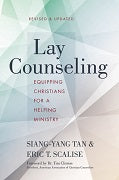by Siang-Yang Tan and Eric T. Scalise, adapted from their newly revised and updated Lay Counseling: Equipping Christians for a Helping Ministry.
The careful selection of lay counselors is a crucial step in the development of an effective lay counseling ministry. However, there is less agreement and even less research on what specific criteria should be used to select counselors.
Minimally we would suggest the following criteria should be used to select lay Christian counselors for a lay counseling ministry:
- Spiritual maturity. The counselor should be a Spirit-filled, mature Christian and committed Christ follower (cf. Gal. 6:1), who has a good knowledge of Scripture, wisdom in applying Scripture to daily living, and a regular prayer life. The person should be known by those in church leadership, have a healthy response to spiritual and other forms of authority, and have a reputation for being a person of ethical integrity and moral character. Prospective counselors should also have a set length of time in which they have been actively involved in the life of the local congregation (we recommend a minimum of one year).
- Psychological stability. The counselor should be psychologically stable, not emotionally labile or volatile, but open and vulnerable. He or she should not be suffering from a serious psychological disorder or major marital conflict (if married). If the person has struggled with either a chemical or process/behavioral (e.g., pornography, gambling, eating disorder) addiction, we recommend a minimum of two years of recovery.
- Love for and interest in people. The counselor should be a warm, caring, and genuine person with a real interest in people and their welfare. This type of ministry is a sacred trust and one that requires a heart of compassion and grace.
- Spiritual gifts. The counselor should possess appropriate spiritual gifts, such as exhortation. Other examples may include wisdom, knowledge, discerning of spirits, mercy, and healing (see Romans 12 and 1 Corinthians 12).
- Some life experience. The counselor should have had some life experience, especially within relational contexts and hence not be too young.
- Previous training or experience in helping people. Academic and formal training or experience would be helpful but not necessary, as this is typically provided within the lay counseling ministry preparation.
- Age, sex, education, socioeconomic status, and ethnic/cultural background. It would be helpful to have a variety of counselors from different backgrounds, ages, and both men and women.
- Availability and teachability. The counselor should have the time to be trained (several hours per week during the training cycle), supervised, and involved in a lay counseling ministry. He or she should be responsive, teachable, and open to learning a biblical approach to helping people.
- Ability to maintain confidentiality. The counselor should be able to understand, respect, and maintain appropriate confidentiality and protect the privacy of clients (according to ministry guidelines).
- Willingness to submit to any required background checks. The counselor must agree to any required background checks as a matter of standard protocol and to help ensure the church is in compliance with its own risk management policies. Given these ten selection criteria, what are the best methods to screen potential lay counselors so that only those who possess all or a majority of the criteria are chosen?
How to Screen Lay Counselors
Gary Collins has proposed a helpful process for screening potential lay counselors and applicants to serve in a counseling ministry. First, solicit a brief written statement from the potential lay counselor affirming his or her adherence to your church’s statement of faith or doctrinal positions, in addition to a testimony of his or her personal salvation and Christian growth experience. It may be helpful to ask for a statement of reasons for wanting to be involved in a lay counseling training program and ministry as well.
Second, require two or three letters of recommendation from different people who know the potential lay counselor or applicant well. Then have the director and another church leader interview the applicant to assess his or her spiritual maturity, stability, and motivation. Do psychological testing of the potential lay counselor (consider using the 16PF
or the Taylor-Johnson Temperament Analysis
Finally, be sure to complete any appropriate background checks. These are usually done at the state level and can identify any possible reports, arrests, or convictions related to child/elder abuse, felonies, and nonspeeding vehicular incidents. This should be a mandatory part of the application process.
— Siang-Yang Tan and Eric T. Scalise, Lay Counseling: Equipping Christians for a Helping Ministry
How to Use This Book
Lay Counseling will equip you with everything you need to establish an effective, biblical program for lay counseling and caregiving in your church. This new edition has been revised and updated in light of fresh research, and it contains useful forms and questionnaires that will help you build your church’s lay counseling ministry and manage it smoothly.

